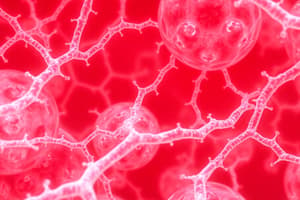Podcast
Questions and Answers
What is the definition of connective tissue?
What is the definition of connective tissue?
A diverse group of tissues that share a common origin, the mesenchyme (mesoderm) of the embryo.
What are the three main components of connective tissue?
What are the three main components of connective tissue?
Fibers, cells, and ground substance.
What is the diameter range of collagen fibers?
What is the diameter range of collagen fibers?
0.5 -- 10 μm.
Collagen fibers are branched.
Collagen fibers are branched.
What property do collagen fibers provide?
What property do collagen fibers provide?
How do collagen fibers stain with eosin?
How do collagen fibers stain with eosin?
What is the repeating banding pattern of collagen fibers observed at?
What is the repeating banding pattern of collagen fibers observed at?
Which collagen type is the most common?
Which collagen type is the most common?
Match the following collagen types with their tissue distribution:
Match the following collagen types with their tissue distribution:
What is the diameter range of reticular fibers?
What is the diameter range of reticular fibers?
Flashcards are hidden until you start studying
Study Notes
Connective Tissue Overview
- Defined as a diverse group of tissues originating from the mesenchyme (mesoderm) of the embryo.
- Composed of three main components: fibers, cells, and ground substance.
Connective Tissue Fibers
Collagen
- Diameter ranges from 0.5 to 10 μm, characterized as unbranched and flexible.
- Indefinite length and variable width contribute to its primary function of providing tensile strength.
- Acidophilic properties: stains pink with eosin, blue with Mallory, and green with Masson's stain.
- Exhibits a banding pattern under electron microscopy, repeating every 68 nm, indicative of collagen's molecular structure (tropocollagen).
- Types of collagen include:
- Type I: Found in bone, skin, tendon, ligaments, and cornea.
- Type II: Present in cartilage and internal organs.
- Type III: Known as reticular fibers, makes up 90% of body collagen.
- Type V: Associated with type I, found in intervertebral discs and skin.
- Type XI: Associated with type II, present in notochord and vitreous humor of the eye.
- Type IX: Fibril-associated, located in cartilage.
- Type XII: Lateral association fibers found in tendons and ligaments.
- Type IV: Forms sheet-like networks, present in basal laminae beneath stratified epithelia.
- Type VII: Forms anchoring fibrils beneath squamous epithelia.
Reticular Fibers
- Composed of thin fibers measuring 0.5 to 2 μm in diameter.
- Key role in providing structural support within various tissues, particularly in lymphoid organs and bone marrow.
Studying That Suits You
Use AI to generate personalized quizzes and flashcards to suit your learning preferences.




